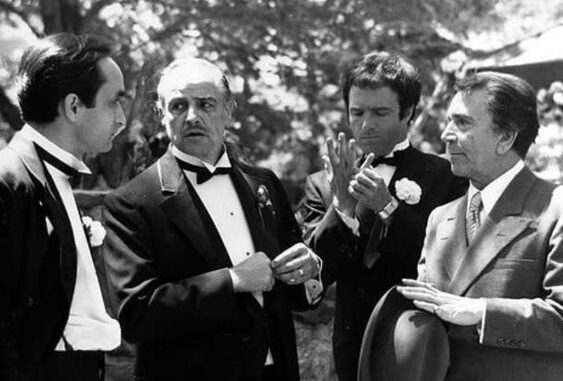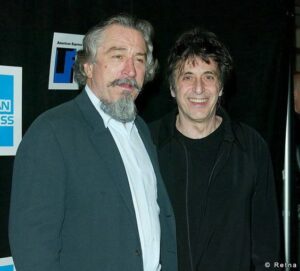
‘The Godfather’ vs. ‘Goodfellas’: There can only be one Boss

When you think of mafia movies, do you immediately hear the mournful trumpet from The Godfather’s elegant main title? Or do you hear Eric Clapton’s “Layla”? It’s the question at the core of a crucial cinematic debate. What is the greatest mob movie ever? Francis Ford Coppola’s epic drama, The Godfather? Or Martin Scorsese’s gritty masterpiece, Goodfellas? Even though Sonny would’ve been pals with Jimmy Conway, and Paul Cicero would’ve been welcome in Don Corleone’s home, these are two very different Italian-American filmmakers telling very different tales about the Italian-American experience. But there can only be one boss, so Kevin Sullivan and I are mere loyal soldiers willing to go the mattresses to argue which film kisses the other’s ring.
Jeff Labrecque (Team Godfather): For two films that get lumped together often because they’re quote-unquote mafia movies, they couldn’t be more different. The Godfather is modern Shakespeare, while Goodfellas revels in the ugly underbelly of mob life. (It’s like comparing High Noon with Unforgiven!) But what makes the Godfather superior to me is Michael Corleone. He is the most iconic, most heartless, most tragic, most mesmerizing movie character of the last… 70 years? Goodfellas, on the other hand, is the story of a rat.
Kevin Sullivan (Team Goodfellas): If anyone were to deny The Godfather’s status as a deserving classic, I’d be the first to tell him he’s dead wrong (like Carlo-dead), but when comparing it to Goodfellas, you’ll have a hard time arguing any kind of superiority. You said it yourself. The Godfather is modern Shakespeare, Drama with a capital D. The action is so heightened and the Corleones operate so far out of the realm of reality, it seems almost artificial compared to the living, breathing world Scorsese knew growing up and shared in Goodfellas. It might be ugly, but Goodfellas doesn’t pull any punches. You can’t say the same for The Godfather.
JL: Goodfellas is certainly more visceral, and, you’re right, it doesn’t pull any punches. But it is nothing more than what it is, if that makes any sense. “Here’s the jaw-dropping story about the miserable lives of real-life cut-your-throat-for-a-buck gangsters. Try not to watch!” The Godfather just happens to be about a regal crime family, but really, it’s the story of power, the story of America. There’s a clue in the film’s first line, “I believe in America,” says the vengeful baker. Reweaving timeless themes into something we’d never experienced before, this is a daring, dangerous movie with something to say to any era and culture. Its characters are both repulsive and magnetic, but they may as well be Kennedys or 16th-century Italian nobles. In 100 years, people will still be studying The Godfather as a great morality tale, while Goodfellas will be equally admired, but only by film students.
KS: You’ve touched on exactly why Goodfellas is the better mob movie of the two, and that’s because The Godfather isn’t a mob movie. It works on a much broader, more universal set of themes. You could swap in any iconic clan and end up with the same great film because, at its core, The Godfather is about America, loyalty, family, etc. Goodfellas is about — yes, it’s about something — a specific lifestyle and the people who lived it. More importantly, when considered with the rest of Scorsese’s filmography, it fits in perfectly with the director’s favorite themes: guilt and destructive forces of masculinity. I’ll admit that The Godfather has more to say about morality, but the issues Goodfellas tackles are more specific and told in a more exciting way. And not to side with the shorter attention spans of today’s average movie-goer/teenager, but there is a reason more people fall asleep during The Godfather than Goodfellas.
JL: Fall asleep? Fall asleep?! May you wake with Khartoum’s head in in your bed! Or worse: May you be forced to watch The Godfather III repeatedly until you want to commit a Frank Pentangeli! Such references bring me to another point: The Godfather has more iconic scenes, and more classic quotes — “I’m gonna make him an offer he can’t refuse” — than any American film ever made. More importantly, “The Godfather is the I-ching. The Godfather is the sum of all wisdom. The Godfather is the answer to any question. What should I pack for my summer vacation? “Leave the gun, take the cannoli.” And that isn’t me talking; that is America’s Most Trusted Actor Tom Hanks in You’ve Got Mail. Are you calling Tom Hanks a liar?
KS: If you have to know one thing about me it’s that I would never call Mr. Hanks a liar. I would, however, like to take a moment to question this very popular notion of The Godfather as “the I-ching.” The Godfather’s status as iconic, as perhaps the greatest movie movie of all time, perpetuates itself. Since its release, fathers have passed the film down to their sons and told them “This is a man’s movie. This is the greatest movie.” Admittedly, I would have a much easier time arguing that The Godfather is literally perfect, than any other film I know of. We as a film culture have been conditioned to not question The Godfather’s perfection, lest we sleep with the fishes. No piece of art deserves that free of a ride, and if we’re talking strictly mob movies, I have to give Goodfellas the edge. Sorry, Tom.
JL: The way you call it a “man’s movie” immediately makes me think of Don Corleone slapping pitiful Johnny Fontaine around at Connie’s wedding. And The Godfather is a total man’s movie, though as you already pointed out, so is Goodfellas and most of Scorsese’s best work. Women are ogled, belittled, and if they stand up to the men, ostracized. If The Godfather has gotten a free ride — and I’m not sure it has — it’s probably because it shattered the Hollywood archetype of the gangster film (Yes, it’s still a gangster film). Michael Corleone is a monster. Yet we root for him even while he destroys his family and torches his own soul. There is no Goodfellas, there is no Scarface or Training Day without The Godfather. There might not even be an Analyze This! Put simply, The Godfather is the godfather of godfather movies.
KS: The Godfather will always be the blueprint for the gangster flick. Its presence in film culture is beyond ubiquitous at this point, and that’s precisely the reason Goodfellas should be considered, at the very least, on equal footing with it. Goodfellas made a huge mark on a genre that remained unchanged for almost 20 years. Scorsese’s film took all of the honor, glamour and shine out of the world Coppola created and served up a piping hot plate of reality, smothered in a marinara sauce. That isn’t to say the lifestyles shown in Goodfellas weren’t without their perks, and we see them in a style that has been imitated more times than I can begin to count, Hill’s voiceover and his club date with Karen especially. The Godfather may have laid the foundation for the genre, but Goodfellas took it to the next level. And the beat down on Billy Batts tops Carlo’s any day.
JL: I feel at any point, the two of us could switch sides and make an equally compelling case for the other’s film. These films might be rivals in some sense, but I don’t know many folks who like one and not the other. They are the yin and the yang of the genre, and they perfectly epitomize the style and personality of their directors. I couldn’t imagine them directing the other’s mafia masterpiece. But I’ll stick with The Godfather because it transcends its genre. And because of Michael. Pacino created a character that cast an enormous shadow on everything he’s ever done since. I loved the production story that nervous studio execs wanted him canned at the beginning of the film because he wasn’t emoting, wasn’t leaping off the screen with charisma. Only after the scene where he shot Sollozzo did they see what they really had. Like I said at the start, Michael Corleone is the most iconic, most heartless, most tragic, most mesmerizing character we have. And I refuse to cross him.
